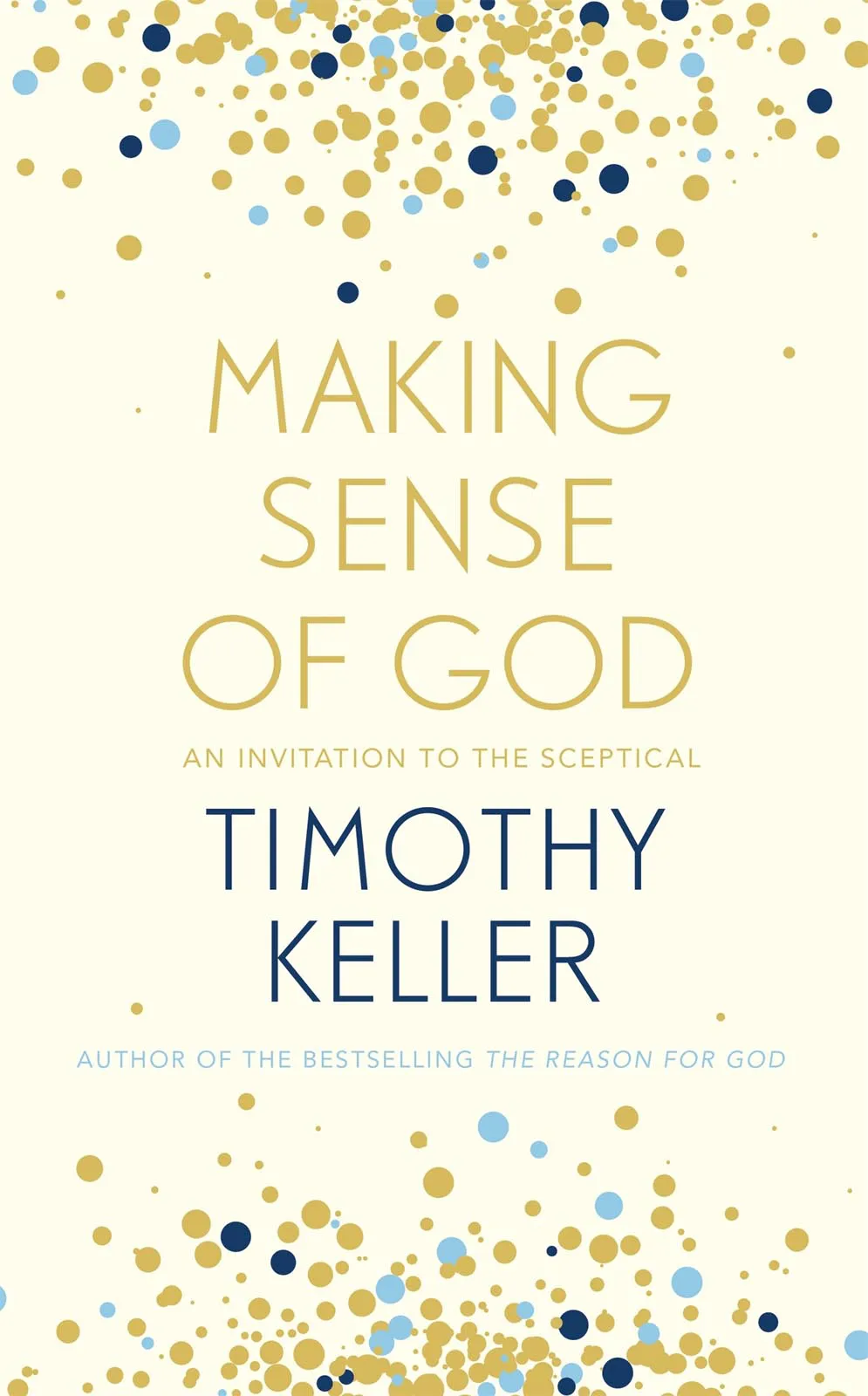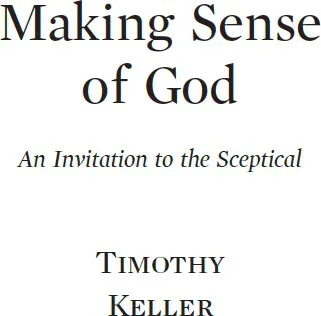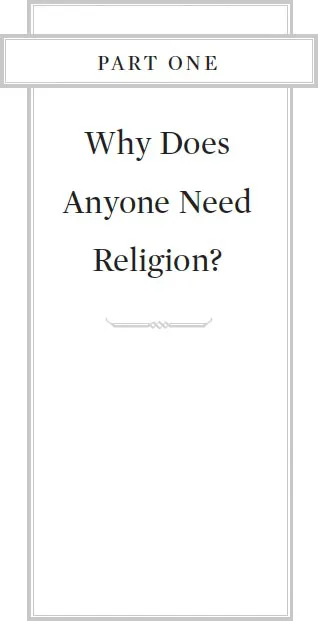
eBook - ePub
Timothy Keller: The Reason for God, Making Sense of God and The Prodigal God
Timothy Keller
This is a test
Partager le livre
- 1,204 pages
- English
- ePUB (adapté aux mobiles)
- Disponible sur iOS et Android
eBook - ePub
Timothy Keller: The Reason for God, Making Sense of God and The Prodigal God
Timothy Keller
Détails du livre
Aperçu du livre
Table des matières
Citations
À propos de ce livre
The Reason for God: this book has been written for believers and non-believers, sceptics and churchgoers, and charts a brilliantly considered and impassioned path to Christianity - a Mere Christianity for the twenty-first century.Making Sense of God: a prequel to Keller's A Reason for God: a thoughtful look at the role faith and religion can play in modern lives. The Prodigal God: focused on Jesus' best-known parable - the prodigal son - as a paradigm for the central messages of Christianity: grace, hope and salvation.
Foire aux questions
Comment puis-je résilier mon abonnement ?
Il vous suffit de vous rendre dans la section compte dans paramètres et de cliquer sur « Résilier l’abonnement ». C’est aussi simple que cela ! Une fois que vous aurez résilié votre abonnement, il restera actif pour le reste de la période pour laquelle vous avez payé. Découvrez-en plus ici.
Puis-je / comment puis-je télécharger des livres ?
Pour le moment, tous nos livres en format ePub adaptés aux mobiles peuvent être téléchargés via l’application. La plupart de nos PDF sont également disponibles en téléchargement et les autres seront téléchargeables très prochainement. Découvrez-en plus ici.
Quelle est la différence entre les formules tarifaires ?
Les deux abonnements vous donnent un accès complet à la bibliothèque et à toutes les fonctionnalités de Perlego. Les seules différences sont les tarifs ainsi que la période d’abonnement : avec l’abonnement annuel, vous économiserez environ 30 % par rapport à 12 mois d’abonnement mensuel.
Qu’est-ce que Perlego ?
Nous sommes un service d’abonnement à des ouvrages universitaires en ligne, où vous pouvez accéder à toute une bibliothèque pour un prix inférieur à celui d’un seul livre par mois. Avec plus d’un million de livres sur plus de 1 000 sujets, nous avons ce qu’il vous faut ! Découvrez-en plus ici.
Prenez-vous en charge la synthèse vocale ?
Recherchez le symbole Écouter sur votre prochain livre pour voir si vous pouvez l’écouter. L’outil Écouter lit le texte à haute voix pour vous, en surlignant le passage qui est en cours de lecture. Vous pouvez le mettre sur pause, l’accélérer ou le ralentir. Découvrez-en plus ici.
Est-ce que Timothy Keller: The Reason for God, Making Sense of God and The Prodigal God est un PDF/ePUB en ligne ?
Oui, vous pouvez accéder à Timothy Keller: The Reason for God, Making Sense of God and The Prodigal God par Timothy Keller en format PDF et/ou ePUB ainsi qu’à d’autres livres populaires dans Theologie & Religion et Religion. Nous disposons de plus d’un million d’ouvrages à découvrir dans notre catalogue.
Informations
Sujet
Theologie & ReligionSous-sujet
Religion


www.hodderfaith.com
Contents
Title Page
Dedication
Preface: The Faith of the Secular
PART ONE: WHY DOES ANYONE NEED RELIGION?
One: Isn’t Religion Going Away?
Two: Isn’t Religion Based on Faith and Secularism on Evidence?
PART TWO: RELIGION IS MORE THAN YOU THINK IT IS
Three: A Meaning That Suffering Can’t Take from You
Four: A Satisfaction That Is Not Based on Circumstances
Five: Why Can’t I Be Free to Live as I See Fit, as Long as I Don’t Harm Anyone?
Six: The Problem of the Self
Seven: An Identity That Doesn’t Crush You or Exclude Others
Eight: A Hope That Can Face Anything
Nine: The Problem of Morals
Ten: A Justice That Does Not Create New Oppressors
PART THREE: CHRISTIANITY MAKES SENSE
Eleven: Is It Reasonable to Believe in God?
Twelve: Is It Reasonable to Believe in Christianity?
Epilogue: Only in God
Acknowledgments
Notes
Further Reading
To all my colleagues who have worked to communicate
faith in a sceptical age
faith in a sceptical age
Especially
Craig Ellis, Mai Hariu-Powell
and my son, Michael Keller
and my son, Michael Keller
Preface

The Faith of the Secular
I have been a Christian minister in Manhattan for nearly thirty years. Most people in the city that is my home are not religious believers. Nor are they what used to be called “C and E” (Christmas and Easter only) Christians. Rather, most would identify as “no religious affiliation” or as “secular.”
Recently the New York Times ran a story about a weekly discussion venue our church holds for people who are sceptical that there is a God or any supernatural reality. The ground rules of the group assume neither that any religion nor that secularism is true. Instead, multiple sources are consulted—personal experience, philosophy, history, sociology, as well as religious texts—in order to compare systems of belief and to weigh how much sense they make in comparison with one another. Most participants certainly come to the discussion with a point of view and have some hope of seeing their own worldview look stronger by way of this process of appraisal. But each person is also urged to be open to critique and willing to admit flaws and problems in their way of looking at things.1
After the article ran, several Internet message boards and forums discussed it. Many heaped derision on the effort. One commenter said that Christianity “makes no sense in the real, natural world we live in” and so has “no [rational] merit” at all. Many objected to the view that secularism was a set of beliefs that could be compared with other systems. On the contrary, they said, it was merely a sensible assessment of the nature of things based on a purely rational evaluation of the world. Religious people try to impose their beliefs on others, but, it was said, when secular people make their case, they just have facts, and people who disagree are closing their eyes to those facts. The only way to be a Christian, another said, is to assume the fairy tales of the Bible are true and to close your eyes to all reason and evidence.
In another forum the participants couldn’t understand why any secular sceptics would ever come to such a group. “Do they think ‘nones’ [those without religious affiliation] in America have never heard the ‘good news’?” one man asked incredulously. “Do they think that secular people will come to such a place and listen and say, ‘why has no one told me of this?’” Another wrote, “People aren’t ‘nones’ because they aren’t familiar with religion—they’re nones because they are.”2
However, over the years I have been in too many of these kinds of discussion groups to count, and the guesses of these critics about them are largely wrong. Believers and nonbelievers in God alike arrive at their positions through a combination of experience, faith, reasoning, and intuition. And in these forums I routinely hear sceptics say to me, “I wish I’d known before that this kind of religious belief and this way of thinking about faith existed. This doesn’t necessarily mean I’m going to believe now, but I’ve never had this much food for thought around these issues offered before.”
The material in this book is a way of offering to readers—especially the most sceptical who may think the “good news” lacks cultural relevance—the same food for thought. We will compare the beliefs and claims of Christianity with the beliefs and claims of the secular view, asking which one makes more sense of a complex world and human experience.
Before we proceed, however, we should take a moment to explore how we will be using the word “secular.” There are at least three ways the word is used today.
One applies the term to the social and political structure. A secular society is one in which there is a separation of religion and the state. No religious faith is privileged by the government and the most powerful cultural institutions. “Secular” may also be used to describe individuals. A secular person is one who does not know if there is a God or any supernatural realm beyond the natural world. Everything, in this view, has a scientific explanation. Finally, the term may describe a particular kind of culture with its themes and narratives. A “secular age” is one in which all the emphasis is on the saeculum, on the here-and-now, without any concept of the eternal. Meaning in life, guidance, and happiness are understood and sought in present-time economic prosperity, material comfort, and emotional fulfillment.
It is helpful to distinguish each of these aspects of secularity, because they are not identical. A society could have a secular state even if there were very few secular people in the country. Another distinction is very common. Individuals could profess to not be secular people, to have religious faith. Yet, at the practical level, the existence of God may have no noticeable impact on their life decisions and conduct. This is because in a secular age even religious people tend to choose lovers and spouses, careers and friendships, and financial options with no higher goal than their own present-time personal happiness. Sacrificing personal peace and affluence for transcendent causes becomes rare, even for people who say they believe in absolute values and eternity. Even if you are not a secular person, the secular age can “thin out” (secularize) faith until it is seen as simply one more choice in life—along with job, recreation, hobbies, politics—rather than as the comprehensive framework that determines all life choices.3
In this book I will be using the word “secular” in the second and third ways and will be offering often sharp critiques of these positions. I am, however, a great supporter of the first kind of secularism. I do not want the church or any religious institution to control the state nor for the state to control the church. Societies in which the state has adopted and promoted one true faith have often been oppressive. Governments have used the authority of the “one true religion” as a warrant for violence and imperialism. Yet ironically the wedding of church and state ends up weakening the privileged religion rather than strengthening it. When people have religion imposed on them through social pressure instead of choosing it freely, they often embrace it in a halfhearted or even hypocritical way. The best option is a government that promotes neither a single faith nor a doctrinaire form of secularist belief that denigrates and marginalizes religion.
A truly secular state would create a genuinely pluralistic society and a “marketplace of ideas” in which people of all kinds of faith, including those with secular beliefs, could freely contribute, communicate, coexist, and cooperate in mutual respect and peace. Does such a place exist? No, not yet. It would be a place where people who deeply differ nonetheless listen long and carefully before speaking. There people would avoid all strawmen and treat each other’s objections and doubts with respect and seriousness. They would stretch to understand the other side so well that their opponents could say, “You represent my position in a better and more compelling way than I can myself.” I admit that such space does not exist, but I hope this book is a small, imperfect contribution toward its creation.
Some years ago I wrote a book called The Reason for God, which, as the title suggests, provides a case, a set of reasons, for belief in God and Christianity. While that book has been helpful to many, it does not begin far back enough for many people. Some will not even begin the journey of exploration, because, frankly, Christianity does not seem relevant enough to be worth their while. “Doesn’t religion call for leaps of blind faith in an age of science, reason, and technology?” they ask. “Surely fewer and fewer people will feel the need for religion and it will die out.”
This volume begins by addressing those objections. In the first two chapters I will strongly challenge both the assumption that the world is getting more secular and the belief that secular, nonreligious people are basing their view of life mainly on reason. The reality is that every person embraces his or her worldview for a variety of rational, emotional, cultural, and social factors.
After that first section of the book, in the next chapters I will compare and contrast how Christianity and secularism (with occasional reference to other religions) seek to provide meaning, satisfaction, freedom, identity, a moral compass, and hope—all things so crucial that we cannot live life without them. I will be arguing that Christianity makes the most emotional and cultural sense, that it explains these life issues in the most trenchant ways, and that it gives us unsurpassed resources for meeting these inescapable human needs.
The Reason for God also does not address many of the background beliefs that our culture presses on us about Christianity, which make it seem so implausible. These assumptions are not presented to us explicitly by argument. Rather, they are absorbed through the stories and themes of entertainment and social media. They are assumed to be simply “the way things are.”4 They are so strong that even many Christian believers, perhaps secretly at first, find their faith becoming less and less real in their minds and hearts. Much or most of what we believe at this level is, therefore, invisible to us as belief. Some of the beliefs that I will address are:
- ▪ “You don’t need to believe in God to have a full life of meaning, hope, and satisfaction” (chapters 3, 4, and 8).
- ▪ “You should be free to live as you see fit, as long as you don’t harm others” (chapter 5).
- ▪ “You become yourself when you are true to your deepest desires and dreams” (chapters 6 and 7).
- ▪ “You don’t need to believe in God to have a basis for moral values and human rights” (chapters 9 and 10).
- ▪ “There’s little or no evidence for the existence of God or the truth of Christianity” (chapters 11 and 12).
If you think Christianity doesn’t hold much promise of making sense to a thinking person, then this book is written for you. If you have any friends or family who feel this way (and who in our society doesn’t?) this book should be full of interest for you and them as well.
After one of the “sceptics welcome” discussions at our church, an older man approached me. He had come to many of our sessions. “I realize now,” he said, “that both in my younger years when I was going to church and in the years in which I have lived as an atheist, I never really looked this carefully at my foundations. I’ve been too influenced by my surroundings. I haven’t thought things out for myself. Thanks for this opportunity.”
My hope is that this book will allow readers both inside and outside of religious belief to do the same.

One
Isn’t Religion Going Away?
You have picked up this book, which shows you have some interest in the question of whether religious belief is possible in our time. But really, should you keep reading? Isn’t a book about the relevance of religion nothing but a desperate, rear-guar...